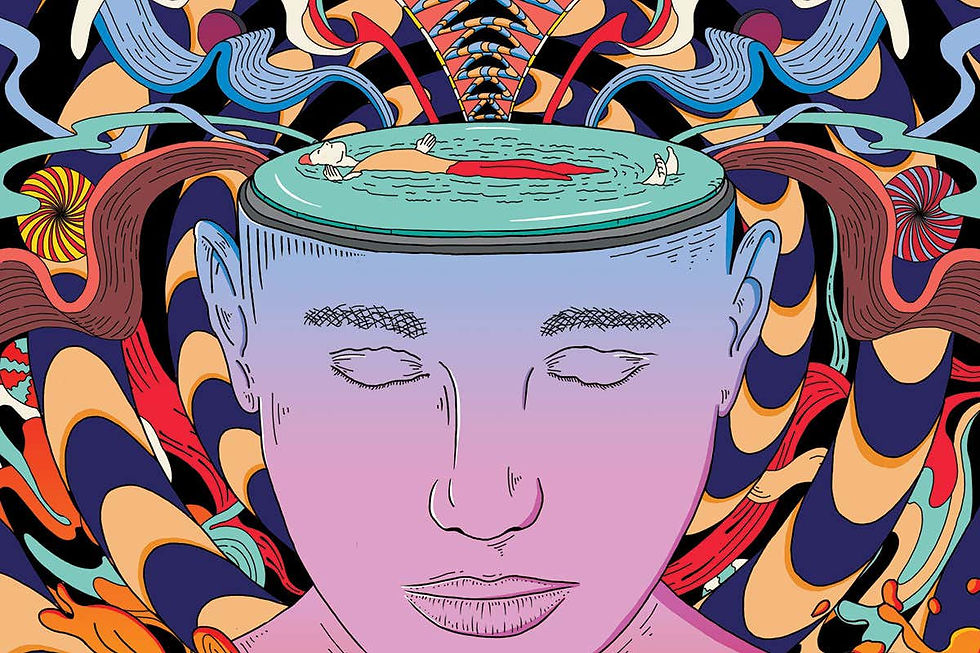Psilocybin Therapy Enhances Cognitive And Neural Flexibility In Depressed Patients
- Anahita Anais
- Nov 29, 2021
- 2 min read
Updated: Jan 9, 2023

A recent study published in Translational Psychiatry suggests that psilocybin-assisted psychotherapy appears to enhance cognitive and neural flexibility in patients with major depressive disorder.
Previous studies have demonstrated long-lasting and clinically significant effects of psilocybin-assisted therapy on personality and mood although the mechanisms behind these changes are not fully known. Scientists theorize that these changes are related to improved neuroplasticity in the brain facilitated by psilocybin.
The researchers behind this study aimed to examine the impact of psilocybin on two characteristics of neuroplasticity: cognitive flexibility (the ability to adaptively switch between mental processes) and neural flexibility (variability in brain activity and connectivity.)
“Many psychiatric disorders have impairments in cognitive flexibility, and during the immediate (i.e., acute) drug effects, psychedelics have been shown to increase certain measures of neural flexibility, signals in the brain thought to be involved in cognitive flexibility,” explained lead researcher Manoj Doss, a postdoctoral scientist in the Center for Psychedelic and Consciousness Research at Johns Hopkins University School of Medicine.
“Some people have asserted that psychedelics enhance cognitive flexibility based on animal data that found that drugs that block the 5-HT2A receptor (the receptor activated by psychedelics) impair cognitive flexibility. However, in both animals and humans, it was recently shown that cognitive flexibility was impaired during the acute effects of psychedelics.”
“What was unclear was after the acute effects wear off but plasticity is supposedly still elevated (e.g., one week after acute psychedelic effects), are cognitive and neural flexibility enhanced by psilocybin therapy?” PsyPost reported.
The researchers examined data from their previous study which had identified preliminary evidence that participants experienced major reductions in depressive symptoms following psilocybin-assisted therapy. The previous study included 24 participants; 13 of whom received psilocybin treatment initially and 11 received the same treatment after an eight-week delay.
The research treatment included 18 psychotherapy sessions two of which were psilocybin-assisted sessions administered two weeks apart. The participants underwent brain scans four weeks before the first psilocybin session and one week after the second psilocybin session. They also completed a measure of cognitive flexibility known as the Penn Conditional Exclusion Test.
"The researchers found that cognitive flexibility was improved one week after psilocybin therapy and dynamic functional connectivity was increased between the posterior cingulate cortex and anterior cingulate cortex, brain regions known to support cognitive flexibility. Doss and his colleagues said that “it is possible that enhancements in cognitive and neural flexibility may open a window of plasticity during which improvements can be facilitated (e.g., with supportive psychotherapy), though this remains speculative.”
The findings however suggest a complex relationship between cognitive and neural flexibility. Increases in neural flexibility were negatively correlated with improvements in cognitive flexibility.“Cognitive flexibility and neural flexibility are increased one week after psilocybin therapy, but there’s not a one-to-one mapping between these cognitive and neural processes,” Doss told PsyPost. “That is, neural flexibility does seem to support cognitive flexibility up to an extent, but too much neural flexibility might not be adaptive, like in the case of poor attention or schizophrenia.”
One key factor to consider with these findings is that this study involved a small sample size and focused exclusively on patients with major depressive disorders. Larger studies involving a wider variety of mental health conditions are needed to better assess the impact of psilocybin-assisted therapy on neural and cognitive flexibility.





.png)